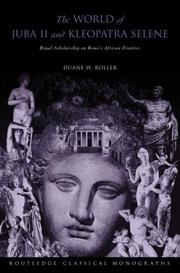| Listing 1 - 3 of 3 |
Sort by
|

ISBN: 1134402953 1134402961 0415754062 1280022884 0203321928 9780203321928 9780415305969 0415305969 9786610022885 6610022887 0415305969 9781134402915 9781134402953 9781134402960 9780415754064 9781280022883 Year: 2003 Publisher: New York Routledge
Abstract | Keywords | Export | Availability | Bookmark
 Loading...
Loading...Choose an application
- Reference Manager
- EndNote
- RefWorks (Direct export to RefWorks)
The World of Juba II and Kleopatra Selene is the first examination in English of Juba's life and career. It analysis the king both as a notable scholar and as an implementer of intellectual programme.
Juba --- Cleopatra, --- Cleopatra Selene. --- Knowledge and learning. --- Mauretania (Kingdom) --- Maurétanie (Kingdom) --- Civilization. --- Kings and rulers --- Séléné, --- Cleopatra Selene,

ISBN: 0415305969 Year: 2003 Volume: *5 Publisher: New York London Routledge
Abstract | Keywords | Export | Availability | Bookmark
 Loading...
Loading...Choose an application
- Reference Manager
- EndNote
- RefWorks (Direct export to RefWorks)
Juba --- Cleopatra, --- Knowledge and learning. --- Mauretania (Kingdom) --- Civilization. --- Kings and rulers --- Mauritanie (Royaume) --- Civilisation --- Rois et souverains --- Cleopatra Selene. --- Maurétanie (Kingdom) --- Juba II --- Knowledge and learning --- Séléné, --- Cleopatra Selene,
Book
ISBN: 1800103654 9781800103658 1843846152 1800103646 9781843846154 9781800103641 Year: 2021 Publisher: Cambridge : D.S. Brewer,
Abstract | Keywords | Export | Availability | Bookmark
 Loading...
Loading...Choose an application
- Reference Manager
- EndNote
- RefWorks (Direct export to RefWorks)
The most influential version of the Troy story for centuries was that recounted in the Roman de Troie, by Benoît de Sainte Maure. This massive poem in Old French claimed to be a translation of two eyewitness accounts of the War, both actually late antique forgeries, but it is in reality a largely original tapestry of chivalric exploits, elaborate descriptions and marvellous creatures such as centaurs and Amazons. The love story of Troilus and Briseida was invented in its pages, later inspiring Boccaccio, Chaucer and Shakespeare. The huge popularity of the Roman de Troie allowed medieval dynasties to create new kinds of political authority by extending their pedigrees back into days of legend, and was an essential element in the inauguration of a new genre, romance. This book uses approaches from theories of translation and temporality to develop its analysis of the Roman de Troie and its context. It reads the text against Geoffrey of Monmouth's History of the Kings of Britain to argue that Benoît is a participant in the Anglo-Norman invention of a new kind of history. It develops readings grounded in both gender studies and queer theory to demonstrate the ways in which the Roman de Troie participates in the invention of romance time, even as it uses its queer characters to cast doubt upon the optimistic genealogical fantasies of romance. Finally, it argues that the great series of ekphrastic passages so characteristic of the Roman de Troie operate as lieux de mémoire, epitomizing the potential of poetry to stop time, at least in the moment. of poetry to stop time, at least in the moment. The author also provides an overview of the complex manuscript tradition of the Roman de Troie in support of the contention that the text deserves to be central to any study of medieval literature.
Trojan War --- Benoît, --- Roman de Troie (Benoît, de Sainte-More) --- Roman de Troie en prose (Benoît, de Sainte-More) --- Benoît de Sainte-Maure. --- Medieval Europe. --- Roman de Troie. --- Troilus and Briseida. --- Trojan War. --- chivalric exploits. --- gender studies. --- medieval literature. --- queer theory. --- romance time. --- temporality. --- translation. --- Early works to 1800.
| Listing 1 - 3 of 3 |
Sort by
|

 Search
Search Feedback
Feedback About UniCat
About UniCat  Help
Help News
News